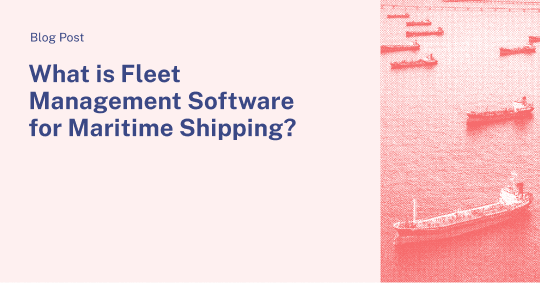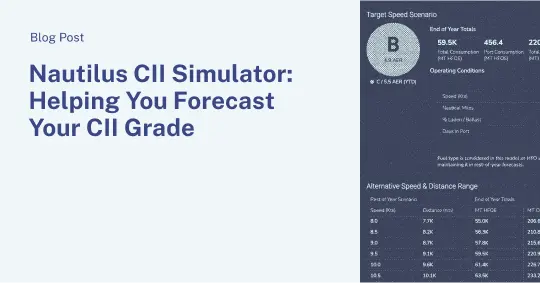How to Navigate Vessel Data Protection and Come Out On Top
At Nautilus, the fact that our solution is interoperable with any other hardware and software provider has been foundational to our success. Given the range of integrations we’ve tackled over the last few years to enable that, we’ve seen some common pitfalls that shipping businesses should avoid to be successful with digital transformation. For example, the right to freely and openly use and transfer all available data is a critical component of achieving operational excellence.
Our industry’s recent accelerated adoption of “big data”—or at least “bigger data”—has caught many shipping businesses off guard, making them prone to consent to locking away their data rights via convoluted legal agreements and unintentionally throwing away the key into the saturated marine technology landscape abyss. In this blog post we will discuss how to approach the contracting process to protect your data rights, how to ensure you are not paying extra for data retrieval services you already have, and how to protect your competitive advantage in a changing environment—where your ability to leverage data to make better decisions is fundamental to your future success.
1. Don’t lose your rights to your data.
How closely did you examine your terms and conditions with your OEM or data software provider? From our experience, commercial negotiations between technology providers and shipping buyers typically overshadow very necessary discussions surrounding service agreements and owners’ rights to data. Your software provider of choice may well be unlocking access to your vessel’s valuable data, but in doing so they may also be blocking you from being able to download, share, or repurpose that data for use with other solutions. The reason for this? Simple. It makes technology providers “stickier,” making it harder, very expensive, and sometimes impossible for you and your teams to be able to test other innovative products or services that can level up your business in the pursuit of operational excellence.
It is not uncommon for some vendors to find ways to sequester ship owners’ data by locking them into “free trials” whereby the business is committing time and effort to test out a proposed solution free of charge, governed by prohibitive data ownership terms and conditions. In order to keep shipping businesses’ best interest at heart, Nautilus structures agreements with very clear success criteria and owner protections in place. And we structure our contracts with one core tenet in focus: the data is your data as an owner—it is literally your intellectual property to do with as you see fit—and owners should always have the rights to this as a first principle.
2. Know what you do and don’t (already) have access to.
We would venture a guess that the set of newbuilds that just commenced operations for your business probably involved a large capital investment. Chances are that your capital investment also contributed to outfitting your newbuild with all the hardware and technology necessary to transmit high quality and high frequency data back to shore. In our sales cycles, we speak with owners who have already (unknowingly) paid for data capture systems during the newbuild process, but information regarding its use and capabilities is buried in technical manuals and siloed from internal teams looking for access to better vessel data sources. This is especially true with some of the larger OEMs who are regularly launching, releasing, re-releasing, and selling telemetry and analysis services, which have, in most instances, been on the maker’s lists for the shipyard your newbuild came from.
The ticket to success is in having a transparent and clear understanding from your OEM of how to retrieve data from the systems you already have onship. Nautilus has been involved in these discussions on behalf of our clients during our implementation process and we continue to be committed to finding ways to interoperate with any pre-existing technology system an owner has in place. And it’s easier now than it’s ever been to liberate IOT data and make it usable inside your business. While the shipyard or OEM may have a vested interest in locking you into a vertically-integrated ecosystem, the reality is that every owner we speak to has a heterogeneous mix of vessels—different yards, makers, etc.— and to actually drive business transformation, it requires a single source of truth for all your ships and teams.
3. Beware of competitors lurking behind your software analytics platforms.
Increased social and regulatory pressures have brought owners, across segments and fleet sizes, together, rallying around a common environmental cause. In spite of this, COVID-19 has introduced increased market volatility and a great deal of uncertainty, and competition is at an all-time high. In a recent blog post we discussed how to harness operational excellence as your competitive advantage.
“If you know the enemy and know yourself, you need not fear the result of a hundred battles. If you know yourself but not the enemy, for every victory gained you will also suffer a defeat. If you know neither the enemy nor yourself, you will succumb in every battle.”
― Sun Tzu, The Art of War
In this type of market, we (and probably Sun Tzu, too), see no place for taking a disadvantaged position. Major ship owners have long been investing in internal performance monitoring solutions, some of which are now being repackaged, spun off, and marketed for use throughout the industry. Now is the time to be cognizant of who you give access to your valuable assets. Owners that heavily invest in R&D efforts to build and sell their own performance solution are doing so because they see the value in possessing a complex data ecosystem to extract maximum yield from their fleet. Buyers should be mindful of what performance monitoring solutions do with that data before granting access to it—which can be hard to tell when an entrenched competitor is behind it.
Working with independent providers eliminates the risk that a competitor gains access to your data. While it’s true that the promise of machine learning requires the use of anonymized and aggregated data to generate useful insights, it’s also the case that this still provides for privacy and ownership protections for everyone involved. Moreover, it’s a democratic benefit—everyone who contributes to the dataset benefits equally from leveraging the broader dataset. Nautilus collects millions of vessel data points that we use to train our machine learning models and refine our services for all customers. The more data we have, the greater the accuracy of our predictive analytics—and the greater value all users get from leveraging a larger dataset.
Evaluating and adopting new technologies to achieve operational excellence should be done with a sharp and critical eye for ensuring the protection of your data assets—and maintaining your data independence. By focusing on how you buy, what you buy, and who you buy from, you can be sure to be protected—and begin to build sustainable advantage with your data. To learn more about how Nautilus can transform your available vessel data into actionable recommendations that drive significant financial return, please contact us at info@nautiluslabs.com.


